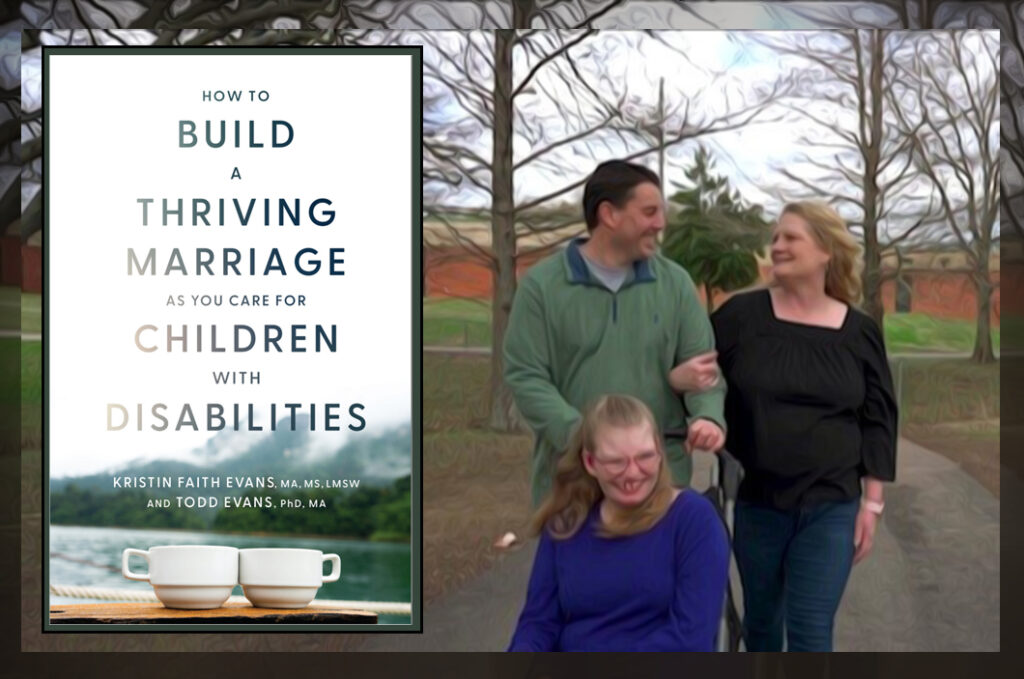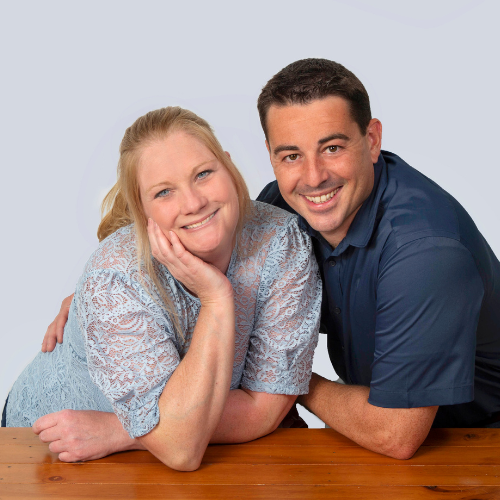How to Build a Thriving Marriage as You Care for Children with Special Needs

Todd and Kristin Evans know that tending to marriage while raising a child with disabilities can be challenging. About 12 years ago after their medically fragile daughter arrived, they decided to give their marriage one more shot before admitting defeat. In their new book How to Build a Thriving Marriage as You Care for Children with Disabilities, they invite parents to join them on a journey toward wholeness in marriage, parenting, and faith.
Early in our marriage, we discovered building a strong marriage can be difficult. But when our medically complex daughter was born, we began to face even more obstacles to staying connected. We learned the hard way that when special needs parents are not intentional, their marriage may be headed toward disaster. We’re sharing three challenges you may also be experiencing and simple ways you can grow a thriving marriage while parenting your child with special needs.
- Commit to a check-in time every day.
As special needs parents, you likely have more to discuss and more serious decisions to make than the average couple. Intense conversations about your child’s needs can easily push out time to engage in more intimate conversations.
Research shows when special needs parents set a consistent ten-minute check-in time every day, their marriages grow stronger. To ensure you have time to connect on a deeper level, agree on a specific time each day that you can set aside all distractions to focus one another. This might be talking on the phone or video chatting over lunch or after the kids are in bed. When you both commit to honoring this time, you will begin to feel more cared for and look forward to those moments. Guard this time and make it a priority.
- Regularly manage stress individually and as a couple.
As special needs parents, you likely experience intense daily stress. When your bodies remain in a chronic state of stress, your emotional and mental health can suffer, you can begin to experience physical symptoms, your marriage relationship can become strained, and your physical intimacy may drastically decrease.
In writing our new book, How to Build a Thriving Marriage as You Care for Children with Disabilities (Baker Books), we learned that regularly managing your own stress in healthy ways and supporting your spouse in coping with their stress can greatly improve your marriage. Individually practicing deep breathing, progressive muscle relaxation exercises, and physical activity are very effective ways to reduce your stress levels.
These are some simple ways we destress together that might help you as well:
- Find a quiet place outdoors to hold hands listening to your surroundings, even if for just five minutes.
- Go for a walk.
- Watch a funny show, tickle one another, or swing on a playground.
- Give your spouse a neck or foot massage.
- Take a hot, scented bath or shower.
- Intentionally build an outside support network.
Caring for your child can easily isolate you and make it difficult to find support and respite. It may feel impossible to find time alone or get out of the house together. Yet, receiving both emotional and practical support can greatly decrease your stress levels and strengthen your marriage. We encourage you to keep searching for different resources. Here are some ideas for finding support:
- Find local churches with a disability ministry, caregiver support group, or respite program.
- Contact your state respite coalition
- Call local college nursing or special education departments for potential caregivers.
- Talk with other special needs parents about swapping child care
We encourage you to take the first step to strengthening your marriage by choosing one of these ideas and trying it with your spouse today. You’ll find many more ideas in our new book How to Build a Thriving Marriage as You Care for Children with Disabilities, which we hope will help you as well.

Do you like what you see at DifferentDream.com? You can receive more great content by subscribing to the monthly Different Dream newsletter and signing up for the daily RSS feed delivered to your email.
References
Jake Johnson and Fred P. Piercy, “Exploring Partner Intimacy Among Couples Raising Children on the Autism Spectrum: A Grounded Theory Investigation,” Journal of Marital and Family Therapy 43, no. 4 (October 2017): 644-61, https://doi.org/10.1111/jmft.12247.
Linda M. Raffaele Mendez, Karen Berkman, Gary Y. H. Lam, and Charisse Dawkins, “Fostering Resilience Among Couples Coparenting a Young Child with Autism: An Evaluation of Together We are Stronger,” The American Journal of Family Therapy 47, no. 3 (2019): 165-82, doi:https://doi.org/10.1080/01926187.2019.1624225.

By Todd and Kristin Evans
Kristin Faith Evans, MA, MS, LMSW and Todd Evans, PhD, MA
Dr. Todd and Kristin Evans are award-winning authors, speakers, and parents of two children with complex needs. Their new book, How to Build a Thriving Marriage as You Care for Children with Disabilities releases in May 2024 by Baker Books. They both earned their MA in Christian Formation and Ministries at Wheaton College in Illinois and have served together in full-time ministry in church, camping, and retreat settings. Todd received his PhD from Vanderbilt University’s School of Engineering and currently manages his own business, and Kristin earned her MSW from the University of Tennessee and is a Licensed Master Social Worker experienced in couples, child and family, substance abuse, and crisis counseling. Connect with Todd and Kristin and learn more about their ministry and free resources at www.DisabilityParenting.com.
2 Comments
Submit a Comment
Subscribe for Updates from Jolene
Related Posts
What’s Working on Your ADHD Journey?
Guest blogger Lisa Pelissier provides ADHD management tips from her own journey and asks, “What’s working on your ADHD journey?”
Enjoying the Holidays with a Food Allergy
Jolene talks about her own family’s struggles and explains her strategies for enjoying the holidays with a food allergy.
Addressing Faith Struggles and Doubts as Special Needs Parents
Kristin Faith Evans offers biblical comfort in addressing faith struggles and doubts as special needs parents.






It is a great book and perfect for a support group to use. Thanks for the comment.
Just finished going through this book with our Special Needs Parent Support Group at our church. It was very well received. The practical, skill-based approach that is woven into the real and personal tone made this book extremely valuable for our couples. Highly recommend!